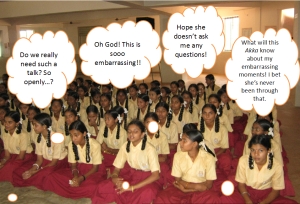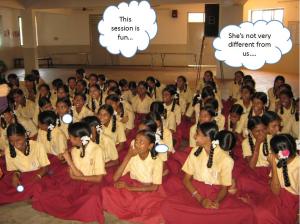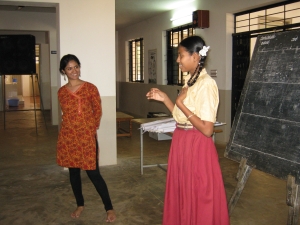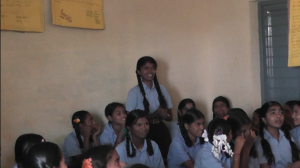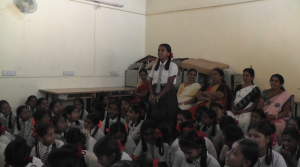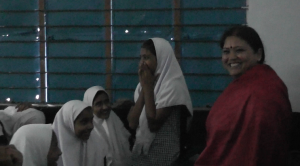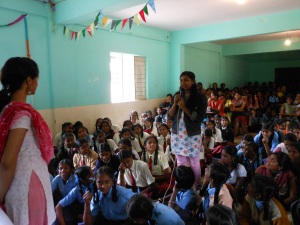How can I ever talk about it?
These are the opening lines that play on most women’s mind when it comes to even thinking about menstruation and all the embarrassing moments that surround it. All women, and I mean absolutely all women in India, have had one or the other moments during her period, especially as an adolescent, that she feels she can never talk about openly. And this is true for rural, tribal, urban, educated and uneducated women.
Pretending it never happened
During trainings for women leaders in IT companies or for ASHA workers in a village to undertake menstrual hygiene sessions, they all begin with the assumption that I will tell them what to tell young girls and their job is to pass on some information regarding menstruation. Instead, I always begin by asking them “If you want to tell others about their period, you first need to be able to talk about yours! So who will be first?” This is usually followed by pin drop silence, with most (previously confident) women now avoiding eye contact with me, and hoping that I’d just vanish into thin air and leave them alone!
Why do women need to talk about it? Can’t we just shut it out of our mind and forget all about it? Can’t we just 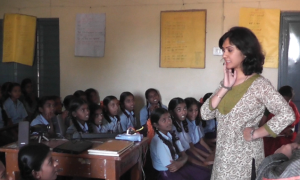 pretend the moments never happened? Moments when boys in class would see us carrying Sanitary Napkins and tease us about it; or the big deal that was made out of attaining puberty with celebration and festivities; or when we would be so nervous about staining our clothes and ask friends to walk behind us; or the time when we were unprepared and suddenly get our period in school and are just too embarassed to get up and ask the teacher to excuse us; or the time when our body suddenly develops and we want to hide beneath sweaters all the time; or the time when we need to announce that we can’t attend a religious function because, uh-well, its that time of the month………..Why can’t we talk about it?
pretend the moments never happened? Moments when boys in class would see us carrying Sanitary Napkins and tease us about it; or the big deal that was made out of attaining puberty with celebration and festivities; or when we would be so nervous about staining our clothes and ask friends to walk behind us; or the time when we were unprepared and suddenly get our period in school and are just too embarassed to get up and ask the teacher to excuse us; or the time when our body suddenly develops and we want to hide beneath sweaters all the time; or the time when we need to announce that we can’t attend a religious function because, uh-well, its that time of the month………..Why can’t we talk about it?
When I started talking about it
When I first started working on this issue in government schools, I began by roping in the “experts” to talk about it to high school girls. So the experts would draw a picture of the uterus on the black board and explain the biological aspects of what caused menstruation. By the end of the session, if the girls were still awake, the experts would invite questions about the uterus, ovary, egg and sometimes, the sperm. Some of them would begin by saying “As a woman, I too feel embarassed to talk about it, so I understand if you hesitate..” And that would be a good way to kill whatever little possibility there might have been of girls expressing their hesitation and fear about menstruation.
It hit me that these women experts, despite their seeming confidence and education, still cannot talk about their own period without cringing inwardly. It also occurred to me that most girls don’t care about how menstruation happens, but rather about getting answers to some of their basic questions and fears, which were never addressed because no expert ever asked them what they wish to know.
So I, along with a dear friend and colleague, Vyjayanti, decided to figure out what girls really want to know, so that we could give them relevant information. But for girls to open up and ask questions, we realized that they need to relate to us as girls who have been through what they go through. Thus began our simple method of beginning each session by sharing our experience when we got our first period.
Looking more like a stand-up comedian, I would stand in front of a classroom full of packed girls and share with them my story. They would together gasp in shock when I told them I attained puberty at the age of 11; they would quietly giggle when I told them how I wondered if I had wounded myself and hence the blood; and they would almost fall off their chair laughing when I told them how I thought that men too wear Sanitary Napkins! In short, I made a complete fool of myself and laughed at every moment that was embarrassing and a big deal to me as an adolescent.
What a amazing transformation this simple act brought about! It changed the entire atmosphere in the classroom, with laughter filling the air, and both students and teachers suddenly relaxing and sharing their own experiences. The fact that I spoke so openly about my period made them realize that it can indeed be spoken about. And even laughed at quite merrily.
I have done more than 100 such sessions in government schools across Karnataka over 3 years and in every single session, regardless of the location, girls have stood up and shared their experience and their doubts in front of the whole class. That is what talking about menstrual hygiene is all about.
Why we need to talk about it
Pretending it never happened, doesn’t make it go away. When we don’t talk about it, we do not think enough about our body and miss the signs when we need attention. A simple act of keeping yourself clean during a period can go a long way in preventing infection. But how can that happen if you can’t even talk to yourself about it? Many girls have shared with me cases of excessive bleeding, discomfort due to possible UTI, symptoms of Anemia, irregular periods and so on. And this has happened only because, finally, they felt that it is not a big deal and they could talk about it and seek help. But the direct implication on health is only one reason why women need to overcome their inhibitions around menstruation.
For years, I could never talk about my period. How even the thought made me cringe with embarassment! But I realise now that these thoughts which we think are neatly tucked away, occupy so much mind space and creep in every now and then in ways unknown to us. What is perfectly normal becomes a big deal and we quietly acquire a low self esteem and learn to live with it. And sadly, we learn to pretend that it is all OK.
Forget the whole argument about whether women should use cloth or Sanitary Napkins; keep aside the whole statistics thrown at us of how young girls drop out of school after they attain puberty, and I would still say that the reason we need to talk about menstruation is far more basic.
When I hear a lady teacher in a rural school say that it is our sad fate to be born as girls; when I meet young mothers who are praying that their next child would be a boy; when a young girl innocently asks me “Akka, why does this happen only to us?” and when I reflect upon my own diffiuclt times growing up and disliking my body, I realise that not being able to talk about it leads to far deeper issues.
Being a woman
Women are naturally gifted in their ability to nurture, to love unconditionally, to feel intensely and passionately, to exercise their high level of intuition and to derive strength from the very things that make us vulnerable. And most importantly, women have the unique gift of creating life. Yet, it is rare to meet a woman who is in touch with herself. What I see, time and again, are women hiding themselves, living in fear and being unnatural. If a woman has to experience all her strengths and natural gifts, she has to feel nice about herself and be absolutely fine with her body, its experiences and its expressions. And that cannot happen if she isn’t honest with herself and with what happens to her body.
Menarche is a beautiful introduction to the beginning of womanhood and all the blessings that come with it. Menstruation needs to be embraced and accepted as a wonderful reminder every month of our ability to create and sustain life. Yes, it comes with its fair share of aches, pains, mood swings and discomfort, but doesn’t its purpose far outweigh the process? Besides, anything that happens to us on a regular basis for a long period of time, does become a part of our routine and life. We need to stop cribbing about it and start welcoming it.
As I started to talk and laugh about my own inhibitions, I realized what a release it was from all the pretense and suffocation of being OK when you are not. And only once I did that was I able to see other aspects of myself that were waiting to be born. My sense of intuition sharpened as I stop cramming my mind with the past; my ability to feel and express love grew as I learnt to accept my flaws and awkwardness; and my ability to connect with others dramatically changed once I connected with myself, completely, honestly and without any ounce of pretence. And this is why we need to start talking about it.
Here are some girls who do talk about it
To know more about my work on promoting menstrual hygiene, visit http://mythrispeaks.wordpress.com/
